Jost Capito's fight to make Williams great again
The era of Frank and Claire was gone and the Grove team had hit hard times. A visionary with a solid record of success was needed. Adam Cooper talks to Jost Capito about taking the call from Dorilton and how he plans to return Williams to the podium
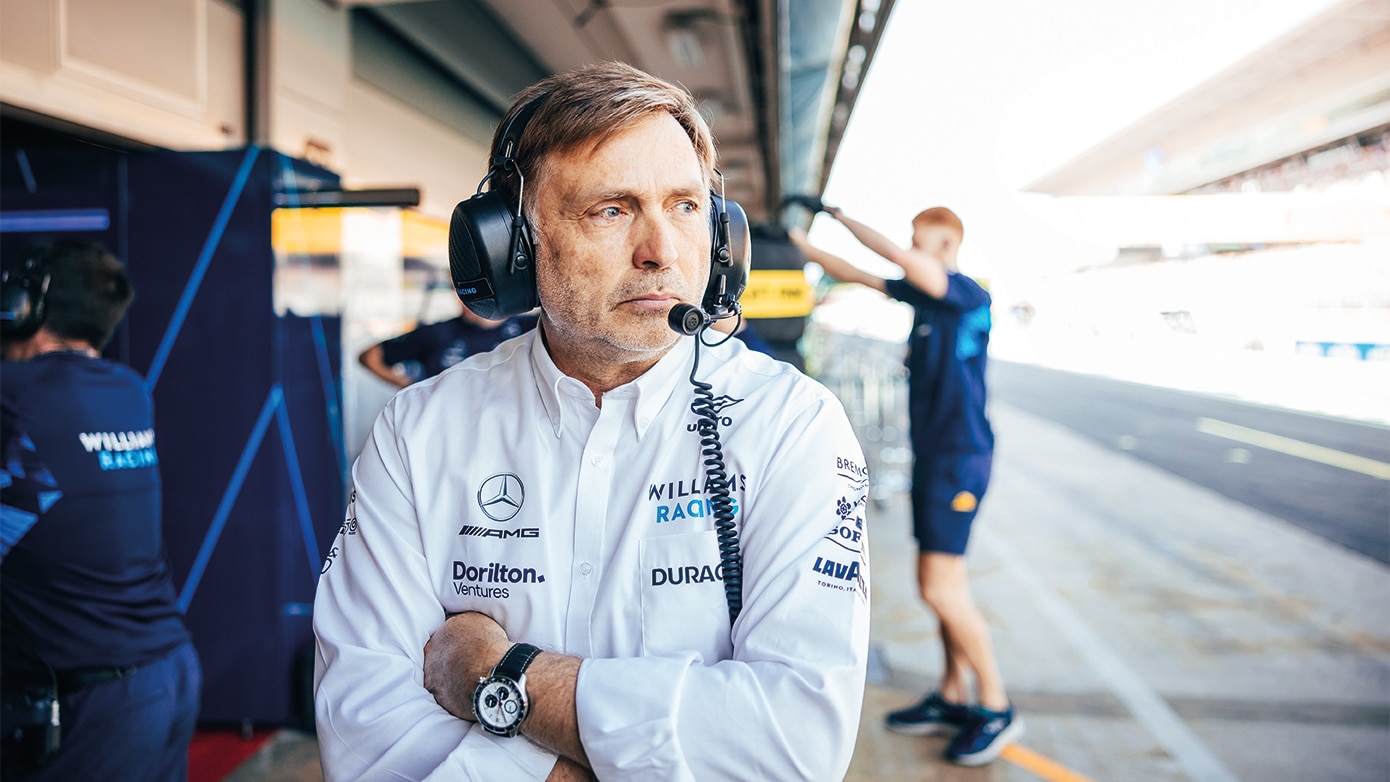
It nearly didn’t happen. Jost capito was a step away from retirement when he agreed to join Williams Racing as CEO in February 2021, before subsequently taking on the team principal role and the membership of F1’s ‘Piranha Club’ that goes with it.
Williams made clear progress last season, taking the chances that circumstances provided. After three dismal years at the bottom of the constructors’ table it climbed to eighth, ahead of Alfa Romeo and Haas.
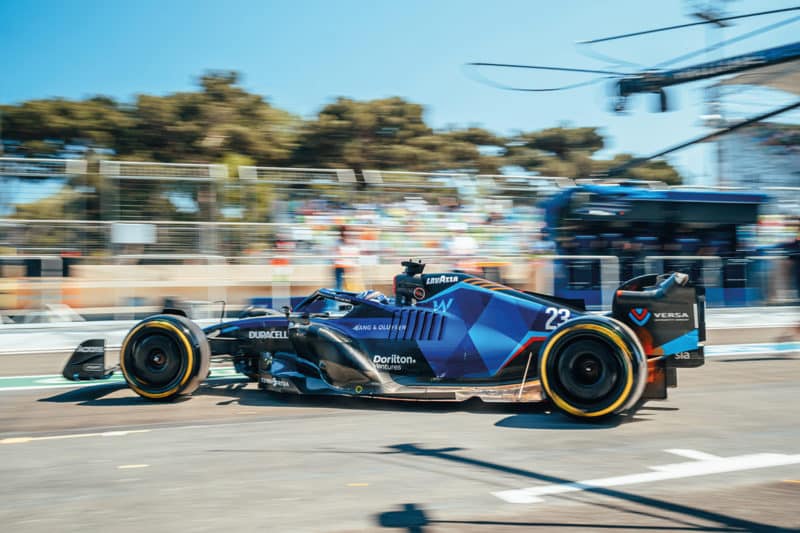
Points have been hard to come by this season, but Alex Albon is seen as a good fit at Williams and looks set to keep his place
Both rivals have made quicker cars in 2022 and once again Williams has fallen to last place. The difference this time is that the FW44 is still good enough to have allowed Alex Albon to occasionally make the points, and now there is real hope and ambition in the camp.
There’s little doubt that Capito has made a difference, helped by the long-term associates he has brought in to boost a team that had lost its way in the latter years of Williams family ownership.
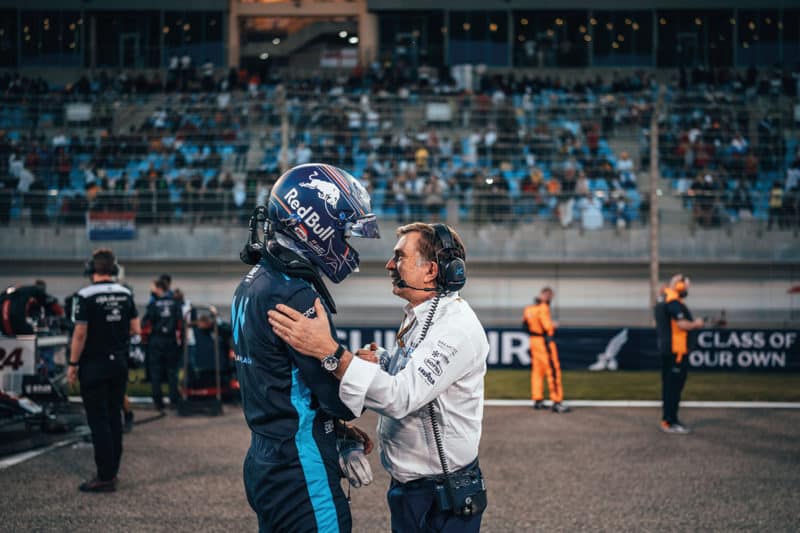
Albon was drafted in to replace George Russell but more was expected of the FW44
The 63-year-old exudes an energy and charisma that clearly inspires those around him. He has an extraordinary CV that includes stints working on road car and motor sport programmes at BMW, Porsche, Ford and VW, while spells with Sauber and McLaren gave him insight into the F1 world.
All of that experience is what led Dorilton Ventures to headhunt him soon after they bought the team in 2020. He also brings to the job a life-long passion for motor sport.
“My father was very much into racing and he founded the local motorbike club,” Capito recalls. “He liked enduro, but was also into cars. I think I went to my first grand prix when I was five or six at the Nürburgring, when it was in the old paddock. I remember we could go into the Ferrari pit, because it was all open. There were not that many people. That must have been ’64-65.
“Later I raced enduro and motocross. On my 16th birthday I picked up my licence at the police at 3am. We drove 300 kilometres and at 8am I started my first 50cc race!”
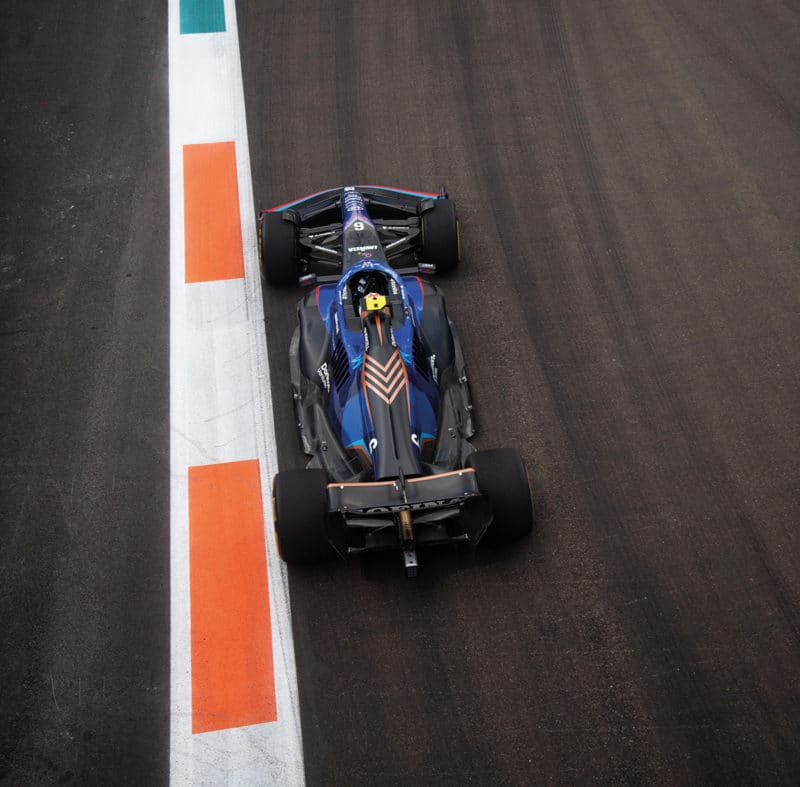
Williams Racing FW44
At some point Capito realised that he was more interested in engines than in competing himself, and he targeted a career at BMW.
“I never wanted to see my career as a professional race driver,” he says. “It was always more on the technical side. I was riding for Zündapp at that time, and they were in Munich. And I wanted to work for Paul Rosche [BMW engineer]. That was always my dream. And so I went to university in Munich, and I pushed hard to get my diploma work at BMW M. They employed me to do the performance development for the M engines.”
He started at BMW in 1984, working on the M3 among other projects. After a while he grew restless, a character trait that has shaped his career, and in 1989 he moved to Porsche.
“Let’s say I need to do different things,” Capito explains. “If something is built up and done, then I have to move on. Then it is what to do next? At Porsche I was going more into management, establishing the Carrera Cup and Supercup. I was the team manager when we won Le Mans with the Dauer 962 in 1994.”
In 1996 his former Porsche colleague Max Welti persuaded him to join Sauber to head a new engineering division backed by sponsor Petronas: “It was doing a master plan on the automotive industry for Malaysia. I thought this is a real good challenge, and the chance of a lifetime.”
In 1998 he was made COO of the whole Swiss-based organisation. He thus had an overview of F1, dealing with the likes of Jean Todt and Stefano Domenicali on Ferrari engine supply, although Peter Sauber remained the public face of the team.
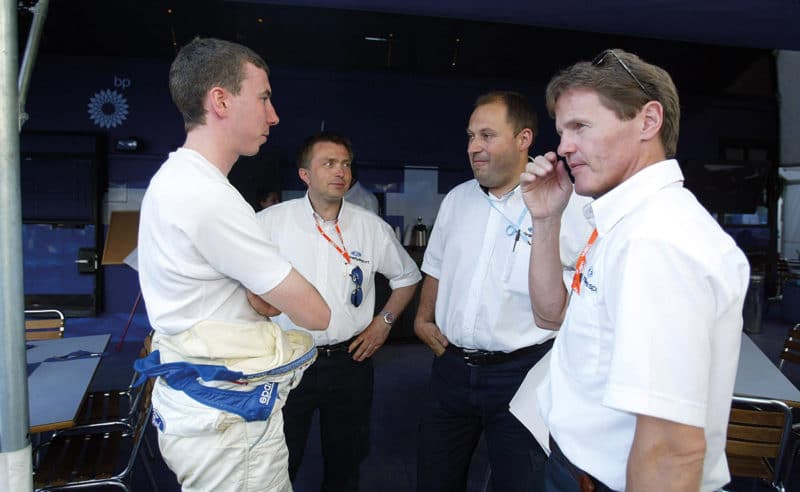
Capito, second left, on Ford duties at the Acropolis Rally, 2003, with, from left, Markko Märtin, Christian Loriaux and Malcolm Wilson
However once again he soon felt it was time to move on, and in 2001 he went to Ford, initially as director of special vehicle engineering. He would remain with the blue oval for more than 10 years.
“I went to my first grand prix when I was five or six at the Nürburgring”
“I was in charge of all the ST and RS models. Then I became race director for Ford of Europe, and I got involved in WRC and with M Sport. In 2009, I moved to the US
on global performance vehicles, and I also got the project of the Mustang Shelby GT 500.”
In 2012 his career took another change of direction: “I got the offer from Volkswagen to get them into WRC, and I thought this was a good chance to go back to Europe.”
On Capito’s watch Sébastien Ogier and VW would dominate WRC from 2013 to 2016.
“To build up the team was absolutely fantastic. And we had the right guys – we got the team structured right. And then we caught everybody by surprise, because the other manufacturers were in there for 20-30 years, and we were coming in as newcomers. That was four years living the dream.”
In late 2016 Capito left VW and returned to F1, having been recruited by Ron Dennis as CEO of McLaren Racing.
“I knew Ron from ’93 when we started the Supercup, and we always had VIP drivers. We negotiated with Ron to get Mika Häkkinen in the car, and he did Monaco and Hungary. You never dream you could have a job like running McLaren or Williams. You have to take these opportunities because as a boy you would never even consider that this could be possible.
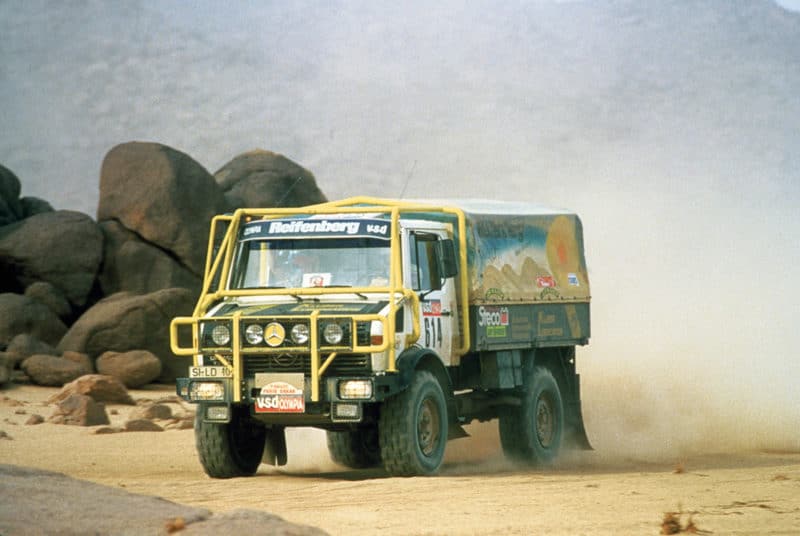
There was victory in the truck class of the 1985 Paris-Dakar Rally for German duo Jost Capito and Karl Friedrich Capito in the Unimog U 1300 L
“Ron knew that changes were needed, and we were very close to identify what we had to do and by which time, and we were very much aligned. But then this alignment you couldn’t get through, because Ron wasn’t there any more.”
It was a turbulent time in Woking and within a few months of his arrival Capito followed Dennis out of the organisation. Why did it unravel so quickly?
“It’s very simple. Ron brought me in, and then Ron was out. It’s not like it was a bad atmosphere, but if somebody like Ron leaves, and everybody who is close to Ron has the philosophy of Ron, you can’t have a team working with two philosophies. So it was the right thing then to go.
“People said if you would have known that upfront, you wouldn’t have done it. I said no, I would still have done it, because I learned so much. It was a great time to work with Ron. To understand the team, the history, where he wants to go and all that was so exciting, and I learned so much. I would do it again, even if I knew it would end the same way.”
At the request of CEO Herbert Diess, Capito returned to VW in early 2017 to manage the R brand. Three years later the Williams opportunity surfaced.
“The new owners approached me,” he says. “I had left VW already; I had early retirement. I had decided to go with my motorbikes and travel, and travel wasn’t that good under Covid! It was the same as with McLaren. If somebody asks you to run Williams, you can’t say no. And I really got a very good impression with the owners. I think we’ve got the same management style, the same leadership style, and we agreed on what should be achieved.”
Capito first had to find out what state the team was in, and what he had taken on.
“The new owners have invested a lot since they came in, but you have to make these investments work. Unfortunately, the team in recent years didn’t have the money to invest and to move forward. And that gets you in a certain mindset. And to change that it’s not that easy because this mentality gets to you if you have to do that for a couple of years. You have to say now we’ve got the investment, and we have to think more forward. It’s not just reacting.”

Capito, second left, on Ford duties at the Acropolis Rally, 2003, with, from left, Markko Märtin, Christian Loriaux and Malcolm Wilson
Some 18 months into his Williams journey he admits that it proved harder than expected.
“It took a while to find out what really has to be changed, where the team actually is. Being for four years at the very back, it has had an impact on the culture; it has an impact on the team mentality. And it kills a bit of the fighting spirit, because you’re not really competing. I think I would say I underestimated that.”
George Russell helped to inspire that change last year. A highlight came at Spa – the race that didn’t happen – where a tyre gamble in qualifying ultimately earned second place.
“That was very important for the team to get a bit of confidence and trust back, to say that we can be in the points. It was a long time without, wasn’t it?
“Also that we have to take some risky decisions on the strategy, and it pays off at the end. It’s not like we tried something different and we did it wrong all the time. I think that also bonded the team together. If you have success, it helps.
“The feeling about Frank is not gone. We won’t let that go”
“You get the best out of a team if the team is motivated. And not motivating by pressure – it’s a negative motivation. I’m very much looking for positive motivation.”
As part of his strategy Capito has recruited several VW associates, notably François-Xaxier Demaison as technical director, and Sven Smeets as sporting director: “You have to have the right mixture. I brought people in for roles that were not occupied. It’s not that somebody lost a job or had to go because I brought in somebody I know. I didn’t do that, and I never did this.”
Russell has gone but in Albon the team has a worthy replacement. Much was expected of this year’s FW44, but Capito admits that it didn’t hit the targets.
“We are not where we wanted to be, and we didn’t achieve the objectives we set for the car. If we would have achieved them, when we do that simulation, we would be in the upper midfield. And so it seems the objectives were right. We just didn’t have the processes yet in place to achieve these objectives, but we believe we know why we didn’t achieve them.
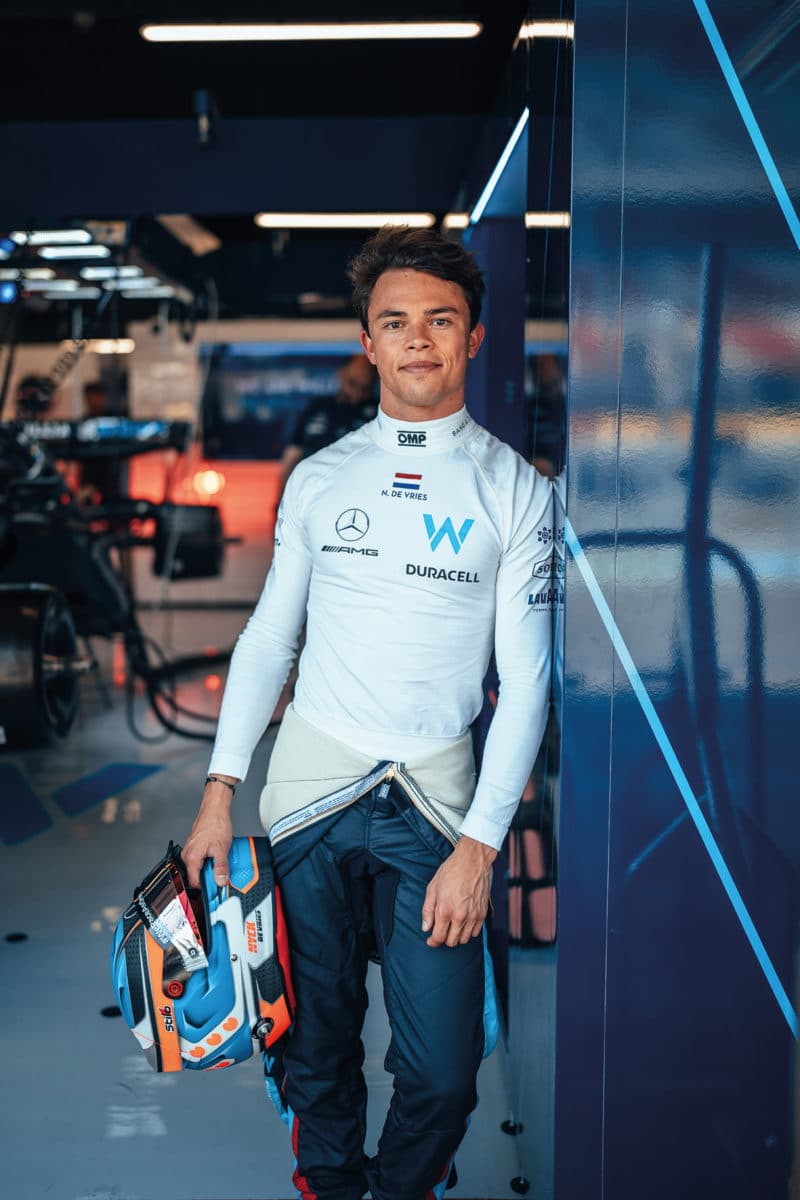
Former Formula E champion Nyck de Vries took part in a young driver session with Williams earlier this year
“And we’re doing steps now, for example establishing a proper project management system that was not in place before, getting more disciplined in the whole development process, and doing some restructuring to become more efficient.”
He remains confident that next season’s FW45 will be much stronger as the changes begin to pay dividends.
“For last year, we couldn’t do a lot, because you have the concept of the car ready at the beginning of the season. So when FX [François-Xaxier] came in the concept was done. And then we had to see what were the processes we had to learn, and we had to go through one loop. So going through this loop, and once the car is in design, you can’t interfere, you have to let it go. I think now is the time when we can say we can implement what we learned through last year.”
How would Capito describe his leadership style, developed across so many diverse road car and motor sport projects?
“I would say inclusive, but firm. And results-driven. I really respect every role that is there, and everybody has to do the best job. If the cleaner doesn’t do a good job, the car might not run properly. Doing the Dakar in the ’80s, you learn everything about motor sport. We were four guys with two trucks, that was it. So you have to build the trucks, you have to run them, you have to be the mechanic, the engineer, the driver, the navigator, the chef, the organisation, you have to do everything. And then you appreciate every single role in the team after that.
“I have an open door policy. Everybody can come and talk to me. Leadership is based on trust and openness, and then finding the objectives – and I’m very objective driven – for each department. And the objectives are based on numbers.
“It’s the right combination of how automotive works, and how racing works. If you get somebody who’s always been automotive, it’s getting too bureaucratic, too much process-driven. And if you have someone who has just done racing, they might not care about processes, might not care about proper objectives.
“And I think that the advantage that I have is that I have been working at the heart of both. And then you can say what’s the best of the two worlds? And bring that together.”
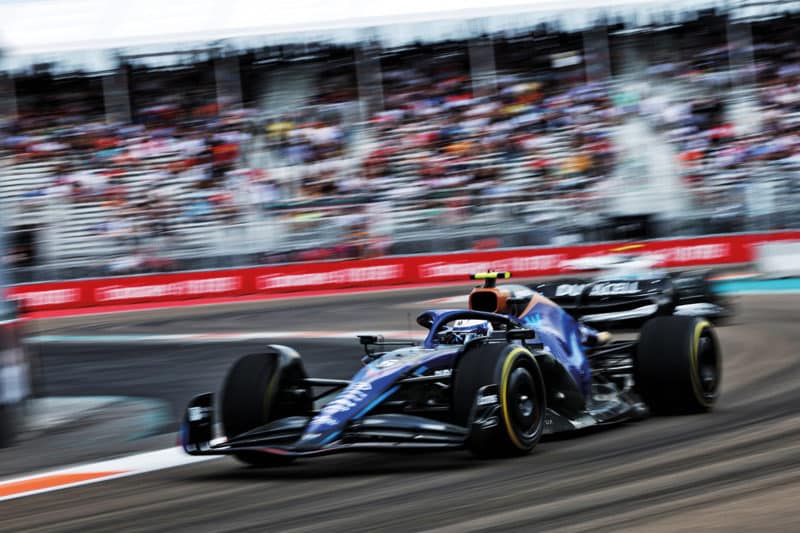
Nicolas Latifi has had a tough championship this year; speculation about his future is rising.
It remains to be seen what the future brings for Williams. The team remains on Audi’s list of possible collaborators, although inevitably Capito insists that Dorilton Ventures is in it for the long haul, and won’t want to sell. Shorter term, the team looks set to replace Nicholas Latifi with loaned Alpine protégé Oscar Piastri next year, which will be a real statement of intent.
Meanwhile Capito is keen to honour the past. It says a lot that Frank Williams and Patrick Head figure prominently on the team’s website as founders.
“Frank is still highly respected, and Claire as well, and they are still on the pictures on the walls. The feeling about the family, about Frank, is not gone from the team and we won’t let that go. And it’s not just to keep it until we are better. The spirit of Frank and the family is still there, and will always be there.”
